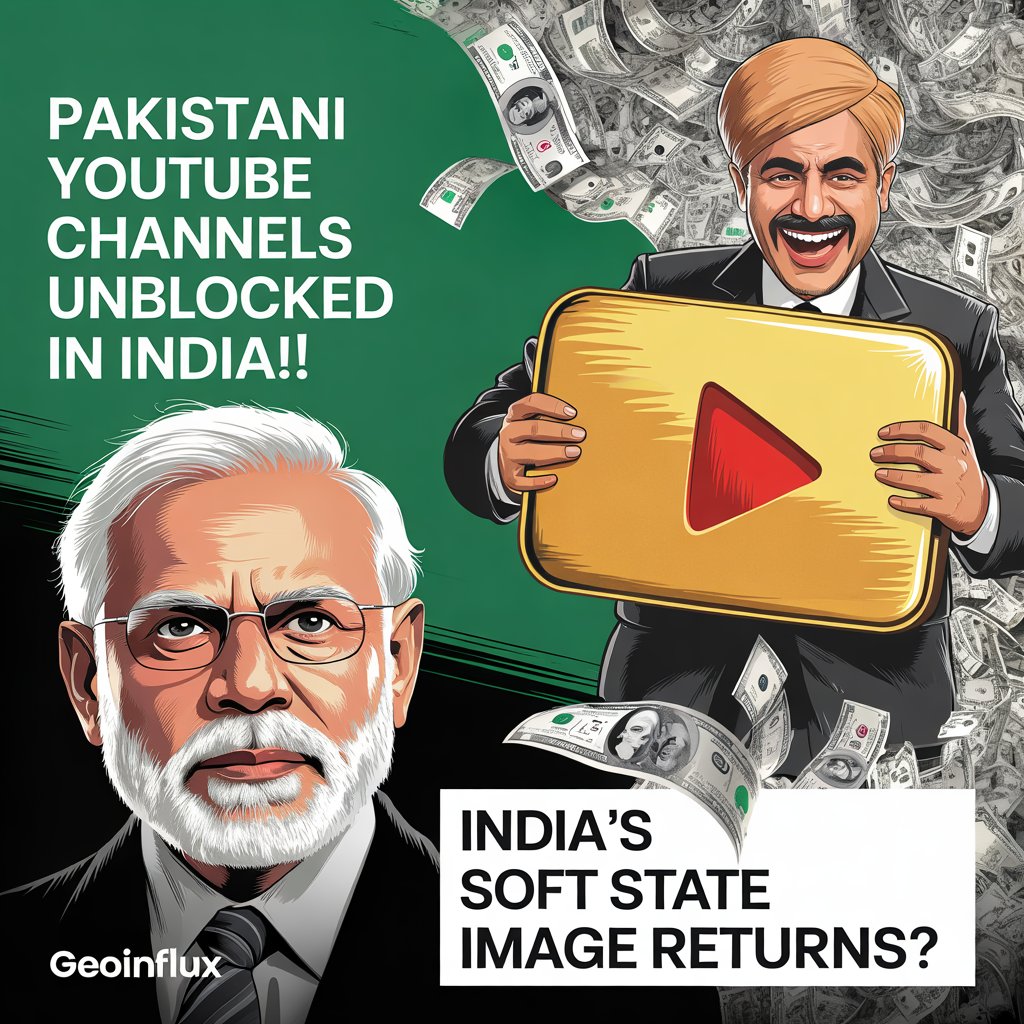India’s Soft State Image Returns?
India’s Soft State Image: India’s decision to unblock banned Pakistani YouTube channels post-Operation Sindoor has reignited the “soft state” debate. Is New Delhi risking national sentiment and security for optics?
🧨 India’s Soft State Image: Digital Policy U-Turn Raises Eyebrows
In a surprising policy reversal, Indian authorities have begun unblocking several Pakistani YouTube channels previously banned following the Palgam terrorist attack and Operation Sindoor.
While this move has been met with celebration across the border, it has reignited a fierce domestic debate—is India reverting to its “soft state” image?
📡 Pakistani Channels: Viewership, Ban, and Sudden Reinstatement
Pakistani content creators, like former cricketer Shoaib Akhtar, who previously enjoyed 1–1.4 million Indian views per video, saw a sharp decline post-ban, dropping to 300–400 views per upload.
The digital blackout significantly disrupted Pakistan’s influencer economy, heavily reliant on Indian traffic. Yet, with no clear explanation or political demand, India’s quiet reversal of the ban has shocked nationalists and analysts alike.
“No one understands what the necessity was, who demanded it, or what happened that made this imperative,” one source noted.
This unexplained policy shift, coming just months after a terrorist attack, is now a flashpoint for growing discontent.
🏏 Cricket, Optics, and Regional Diplomacy
Adding fuel to the fire, Pakistani media has claimed that India will participate in Asia Cup 2025, and that India-Pakistan cricket ties will resume soon—even without BCCI confirmation.
The symbolism is important:
- Hosting rights are still with India.
- A neutral venue like the UAE may be used.
- Yet Pakistan claims victory in narrative diplomacy.
Coupled with YouTube unblocking, many see this as India yielding under pressure, further embedding the India’s soft state label.
⚖️ What Defines a “Soft State”?
The term “soft state” refers to a government that:
- Avoids hard decisions fearing short-term fallout.
- Does not retaliate adequately to threats or attacks.
- Prioritizes convenience over consequence.
From a policy lens, soft states fail to impose costs on adversaries. Despite past military responses like surgical strikes, symbolic actions like YouTube bans—and their reversals—send mixed signals.
“India’s problem is that we have never imposed a price on any country for actions taken against us.”
— Former Deputy NSA Satish Chandra, cited by University of Pennsylvania
This haunting observation from 2010 is still being referenced in 2025.
🚫 Strategic Frustrations: Are Enemies Getting a Free Pass?
Critics argue that India’s inaction post-26/11, and similar events, emboldens enemies and weakens deterrence.
The unblocking of Pakistani channels—despite:
- Cross-border terrorism,
- Anti-India propaganda, and
- Digital misinformation campaigns
—sends a message that New Delhi may talk tough but avoids long-term confrontation.
This perception also extends to neighboring countries. Rising anti-India sentiment from users in Nepal, Bangladesh, and elsewhere on platforms like X and YouTube remains largely unaddressed.
🧭 The China Angle and the SCO Paradox
India’s recent participation in the SCO Summit in China, even as Beijing supplied PL-15 missiles and intelligence to Pakistan post-Palgam, raised further concern.
Despite being a victim of cross-border terror:
- India’s final SCO statement did not mention Palgam.
- The Quad countries, not India, raised the issue.
This contrast between security rhetoric and diplomatic behavior only deepens the soft state critique.
Some fear India may even consider restarting the Indus Water Treaty, suspended post-Operation Sindoor—a move that would reinforce the narrative that India yields after temporary outrage.
📊 India’s Soft State Image Returns? Summary Recap Table
| Key Issue | Detail |
|---|---|
| Pakistani Channels Unblocked | Ban lifted despite terror attack context |
| Economic Impact of Ban | Massive drop in Pakistani YouTube earnings |
| Cricket Diplomacy | Unverified reports of resumed Indo-Pak matches |
| Soft State Traits | Avoidance of hard decisions; lack of retaliation |
| Historic Warning | Satish Chandra’s quote on India never imposing a price |
| China Engagement | SCO visits continue despite Chinese support to Pakistan |
| Public Perception | Frustration over inconsistency in national security responses |
❓ FAQs on India’s Soft State Perception
1. What does “soft state” mean in the Indian context?
It refers to India’s perceived reluctance to take hard decisions, especially regarding national security and retaliation.
2. Why were Pakistani YouTube channels banned earlier?
They were banned after the Palgam terror attack and Operation Sindoor, in response to cross-border aggression.
3. Why is the unblocking controversial?
There was no transparency or political explanation, despite public anger and ongoing security threats.
4. Is India attending the Asia Cup in Pakistan?
Not confirmed. Pakistani media claims so, but India may prefer a neutral venue if at all.
5. How is China involved in this narrative?
China supports Pakistan militarily yet India still engages diplomatically, sparking criticism of inconsistency.
🔗 Related Articles from Geoinflux.com
- India’s SCO Terrorism Stance Exposes Deep Rifts with China
- India-China Dynamics: Strategic Balancing in SCO
- Is India Losing its Digital Influence in South Asia?
📚 References for India’s Soft State Image
- University of Pennsylvania — India’s Soft State Dilemma (PDF)
- The Economic Times — Shoaib Akhtar YouTube Ban Impact
- India Today — Asia Cup 2025 Hosting Rights Controversy
- The Hindu — India’s SCO Diplomacy After Palgam Attack
- OpIndia — YouTube Channels from Pakistan Get Unblocked in India
- Times of India — Indus Waters Treaty and Diplomatic Fallout

